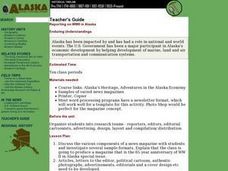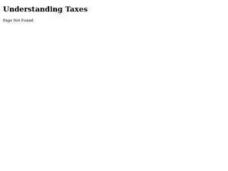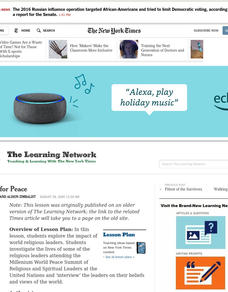Curated OER
Treasure of the Tar
High schoolers, using an atlas, locate the region known as the "Tar Sands" in the Central Plains of Canada. They hypothesize about the future economic potential of this natural resource. They create a poster about the Tar Sands industry...
Curated OER
The 1920s: The Rise of Consumer Culture
Students examine economic, social, and cultural aspects of the 1920s. They provide a brief political history of the 1920s, focusing on the death of Warren Harding (Was he poisoned by his wife?) and develop skills in analyzing...
Curated OER
Understanding the Effects of Currency Exchangerates
Students examine the economic effects of a strong and weak U.S. dollar. They identify the currency used in countries which regularly trade with the U.S., discuss the pros and cons of a strong U.S. dollar, and calculate the prices in...
Curated OER
Reporting on WWII in Alaska
Students explain the people and the political, geographic, economic, cultural, social, and environmental events that have shaped the history of the state, the United States, and the world.
Curated OER
Ft. Vancouver Fur Trade: a Skin for a Skin
Learners examine political presence of Hudson's Bay Company, explore economic impact of European demand for beaver pelts and the fur trapping trade, and practice counting in Chinook Jargon.
Curated OER
Navajo Code Talkers of WWII
Eighth graders assess different ways that significant individuals and events influenced economic, social and political systems in the United States after 1880. They experience a Navajo code talker's dictionary to create and decode messages.
Curated OER
When Rice Was King
Students examine the origins of rice production in the South. They identify the steps involved in rice cultivation, examine photos of plantation life, conduct interviews, and research the economic base of their own community.
Curated OER
Welcome to New York State
Students choose one region of New York state, and create a travel brochure that includes information such as geographical features, tourist attractions, accesibility, economic features, and historical events that occured in that region.
Curated OER
Refugees
Learners investigate the affect of refugees have one their host country. They examine where refugees go and decide on things that might be affected by their influx such as medical care, moral issues, economic issues, and language barriers.
Curated OER
Political Reform in the Late 1800s
Eleventh graders examine the type of political reform in the 1800s. In groups, they analyze the Pendleton Civil Service Act and two other economic acts. To end the lesson, they take a quiz and discuss the impact of the acts on the...
Curated OER
Why Does Money Have Value?
Middle schoolers study money and its value and usage in the world today. For this economic lesson, students research money as they learn what it stands for, why it is important, how it is valued and what it represents in the United States.
Curated OER
Inside the Vault-Entrepreneurship
Students explore entrepreneurship. In this economic study lesson plan, students take a pretest on attitudes, review characteristics that make up an entrepreneur, review a list of famous entrepreneurs, and create a 5 minute oral...
Curated OER
Money, Money, Honey Bunny!
Students determine the differences between goods and services, and saving and spending. In this economics lesson, students listen to a rhyming story about a bunny with money. They play a matching game with the associated cards and work...
Curated OER
Terror Tantrum?
Students explore elements that help shape political and economic relationships between different countries and examine the effects of a recent terrorist attack in Saudi Arabia.
Curated OER
River Planning
Students use a model to conduct an experiment involving dam construction. Based on their observations, they draw conclusions about social, economic, and and environmental issues and make a decision concerning dam location. As a group,...
Curated OER
I Didn't Do It! (Is Anyone guilty Anymore?)
Students explore the concept of "reasonable doubt" in our criminal court system and compare it to "preponderance of the evidence" in the civil court system. They discuss the trials of OJ Simpson and other historical criminal defendants.
Curated OER
Hut One, Hut Two ... Teams of the National Government: The Three Branches of Government
Eighth graders examine the three branches of government and the system of checks and balances.
Curated OER
The Taxpayer's Responsibilities
Learners explore system of voluntary compliance, and describe taxpayers' responsibilities related to filing a tax return.
Curated OER
Science: Arsenic and Old Lace
Students read about specific instances of arsenic in history and share these stories with each other. They identify, after reading the articles and sharing, what role arsenic played, how arsenic enters the system and what its effects...
Curated OER
Basic Animal Behavior in Domesticated Animals
Pupils investigate animal behavior, examining the nervous system and the physiology of the brain and the fight or flight response. They simulate animal behaviors and discuss the difference between an instinct and a behavior.
Curated OER
Praying for Peace
Pupils investigate the lives of some of the religious leaders attending the Millennium World Peace Summit of Religious and Spiritual Leaders at the United Nations and 'interview' the leaders on their beliefs and views of the world.
Curated OER
"You shall not crucify mankind upon a cross of gold!" The Issue Bimetallism in the Late Nineteenth-Century
Learners research the basis of the monetary system suring the 19th century. They complete a worksheet and justify the pro-silver or the pro-gold argument.
Curated OER
Anne Frank: Rescuers
Students discuss heroic behavior of individuals from the Holocaust. They examine early civilizations and their contributions to the foundations of human culture. They
recognize that heroic behavior (just like discrimination) is done...
Curated OER
Road to Revolution
Students discuss reasons war erupted between Britain and the colonies. They examine and explain critical events of the 1760s, and discuss what rights and beliefs Americans felt were being violated.























